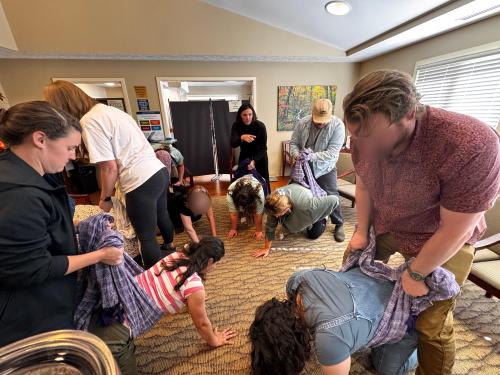As a doula supporting families in the vibrant Asheville area and surrounding counties like Buncombe and Henderson, I've had the privilege of witnessing firsthand how prenatal care shapes the journey to parenthood. Nestled in the Blue Ridge Mountains, Asheville offers a unique blend of holistic wellness and cutting-edge medical services, making it an ideal spot for innovative approaches to pregnancy care. If you're an expecting parent searching for prenatal care options in Asheville, NC, you're in luck—local practices provide both time-tested traditional models and a transformative group-based alternative known as Centering Pregnancy.
In this post, we'll dive into the differences between these models of prenatal care, highlight where you can access them locally, and share insights on their benefits—drawn from my experiences and evidence-based research. Whether you're drawn to the intimacy of one-on-one visits or the community spirit of group sessions, understanding these options can empower you to choose what aligns best with your needs. Let's break it down.
The Traditional Model: Personalized, One-on-One Prenatal Care
Most small OB/GYN practices in Asheville and nearby areas, such as Biltmore OB/GYN Physicians or independent providers affiliated with Mission Hospital, follow the traditional obstetric care model. This is the standard approach recommended by the American College of Obstetricians and Gynecologists (ACOG) for routine pregnancies. Here's how it typically unfolds:
From my doula perspective, traditional care works beautifully for families who value individualized attention, especially those with unique medical histories. Practices like Biltmore OB/GYN in Asheville offer this alongside high-risk pregnancy support, ensuring seamless transitions to delivery at facilities like Mission Hospital.
For a traditional model of support, Biltmore OB/GYN is top notch and one of my absolute favorite practices to work with.
The Centering Pregnancy Model: Group Care That Builds Community
Enter Centering Pregnancy—a certified, evidence-based group prenatal care model that's gaining traction in Asheville. Developed over 30 years ago by the Centering Healthcare Institute, it's not entirely "new," but it's revolutionary for our mountain communities, where social isolation can amplify pregnancy stresses. Unlike traditional visits, Centering group prenatal care transforms routine checkups into interactive, supportive gatherings.
These programs are open to low- to moderate-risk pregnancies, with referrals for higher-risk cases. As a doula, I've attended births where Centering families arrive feeling connected and prepared—often forming lasting friendships over shared hikes or playdates in the Smokies.
Why Centering Pregnancy Stands Out: Benefits for Families and Providers
What makes Centering model of care so special? Research shows it delivers outcomes equal to—or better than—traditional prenatal care, with no added risks. A landmark study of over 1,000 women found a 33% reduction in preterm births, plus lower rates of low birth weight and preeclampsia. Other perks include higher breastfeeding rates, better prenatal visit attendance, and increased patient satisfaction—women report feeling more empowered and less anxious.
From my vantage point as a doula, the magic lies in the relationships. In a Centering group, you're not just a chart—you're part of a cohort sharing fears, joys, and tips (like the best nausea remedies from local herbalists). This builds resilience, reducing isolation that's common in rural Western NC counties.
But here's an under-the-radar benefit: It elevates providers too. Centering requires a dedicated doctor or midwife team to lead all 10 sessions, diving deep into families' stories, questions, and emotions. I've seen "great" Asheville OBs evolve into exceptional ones—more empathetic, proactive, and attuned to holistic needs. At Asheville Women's , for instance, facilitators report stronger partnerships with patients, leading to fewer interventions during labor. It's a win-win: Families get richer support, and providers grow through meaningful connections.
Choosing Your Path: Tips for Asheville Expecting Parents
Deciding between traditional prenatal care and Centering Pregnancy? Consider your personality—if you thrive on community, go group; if privacy is key, stick with one-on-one. Both are covered by most insurances, but confirm with your provider. Start by scheduling a preconception or early prenatal chat—many Asheville practices offer virtual intros.
Local resources amplify either model: Pair care with doula support (like mine!), prenatal yoga at Asheville Community Yoga, or nutrition guidance from Mountain Area Pregnancy Services (MAPS). Remember, the goal is a healthy, joyful pregnancy tailored to you.
Asheville's prenatal landscape is evolving, blending mountain serenity with innovative care. Whether traditional or Centering, these models honor your journey. Ready to explore? Contact MAHEC or Asheville Women's today. What's your prenatal care question? Drop it in the comments—I'm here to help.